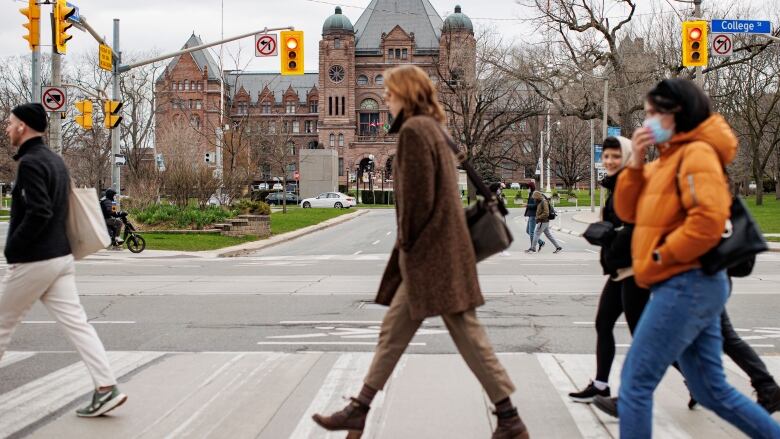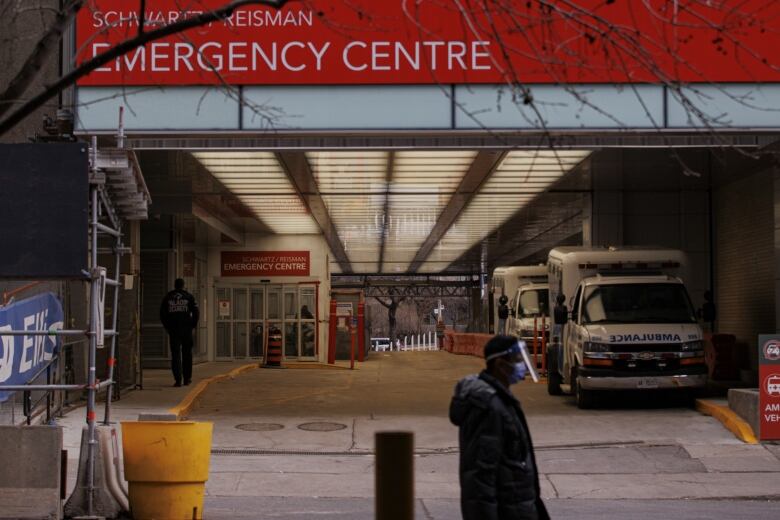Previous COVID infection provides an 'edge' over Omicron especially with vaccination
2 doses plus infection is comparable to 3 doses at preventing severe COVID-19: study

This is an excerpt from Second Opinion, a weekly roundup of health and medical science news.If you haven't subscribed yet, you can do that by clickinghere.
A new Canadian study found catching COVID-19 provided strong protection against future Omicron reinfection and hospitalization especially when combined with vaccination.
The observational study of close to 700,000 people age 12 and over in Quebec, released as a preprint this week and not yet peer reviewed, suggested that having an earlier strain of the virus dramatically reduced the risk of getting the original Omicron variant in the future.
"Even in people who did not receive any vaccine there was protection against Omicron infection," said lead author Dr. Gaston De Serres, an epidemiologist at the Quebec National Institute of Public Health (INSPQ).
"However, the protection against hospitalization is much higher than your protection against being reinfected and obviously the good news is if you add vaccine doses, then you add to your protection."
The landmark study provides the first major glimpse at how protection from vaccination, prior infection and combined hybrid immunity is holding up against Omicron in the real world in Canada and has major implications on our vaccination guidelines in the future.
"You don't want to get COVID. I mean, that's clear because it's unpredictable, you could die, you could wind up in the hospital and you could get long COVID," said Dr. Eric Topol, a professor of molecular medicine at Scripps Research in La Jolla, Calif.
"However, if you did have COVID before the Omicron wave and you survived it did provide an edge."

Hybrid immunity provides 'remarkable' protection
The study also found vaccines were more effective against Omicron infection among the previously infected than the non-infected: increasing to 65 per cent versus 20 per cent for one dose, 68 per cent over 42 per cent for two and 83 per cent over 73 per cent for three.
But prior infection immunity alone didn't last with the study showing the risk of an Omicron reinfection dropped from 66 per cent after three to five months to just 35 per cent between nine and 11 months.
Unvaccinated individuals who were asymptomatic after infection also had only an eight per cent reduction in future risk of infection, while symptomatic non-hospitalized patients had a 43 per cent reduction and hospitalized symptomatic patients had a 68 per cent reduction.
"The more severe the infection, the better you're protected the more vaccine doses, the more you're protected," De Serres said. "And the order of your vaccine doses and infection did not appear to change the degree of protection you had."
Protection from previous infections against Omicron hospitalizations was also significant among the unvaccinated at 81 per cent, but increased to 86 per cent with one dose, 94 per cent with two and 97 per cent with three.
"What this study did was reinforce that if you got through COVID, you survived it, you will not only have a good protection from hospitalizations, but also you benefit from at least one if not two shots of vaccine," said Topol.
"In fact, if you got three shots you got to remarkable levels of protection against infection and hospitalization So it encourages people who are still out there who had prior COVID to go get vaccinated."

Booster priorities could shift in Canada
But the findings also highlight the limited added protection from a booster dose among the previously infected against severe COVID-19 as opposed to just two shots.
"Our findings do suggest that the incremental value of a third over second dose in someone who's previously infected is marginal," said Dr. Danuta Skowronski, epidemiology lead at the British Columbia Centre for Disease Control who co-authored the study.
"And if there are remaining other groups who have yet to receive even their first or second dose or are otherwise more susceptible the doses would be better prioritized that way."
De Serres said that while the study found two-dose effectiveness against hospitalization among the previously-infected did not wane substantially after 11 months, it also did not significantly differ from three-dose effectiveness.
"If someone had been infected recently, should that person run to get the vaccine right after three months? Well, maybe not," he said, adding that the close to half of Canadians who became infected with Omicron over the past few months had significant immunity.
"The population that was infected during wave five and six may already be quite well protected for the next season and maybe they could be offered an additional dose but maybe it won't be so pressing for them."
The study looked at the original BA.1 Omicron variant between Dec. 26 and March 22, and not the BA.2 subvariant that has since become the dominant strain in Canada or other sublineages like BA.2.12.1, BA.4 and BA.5 that are circulating in other parts of the world.
Nevertheless, the findings call into question the value of the National Advisory Committee on Immunization's (NACI) decision to recommend a booster shot three months after an infection, when protection against severe illness already remains high with two shots.
"It's not to say that the third dose didn't increase it, but it's from 94 per cent to 97 per cent," said Skowronski. "It really just begs the question, what are we trying to achieve with this?"
WATCH | WHO estimates nearly 15 million people died in COVID-19 pandemic:
No plans to change booster guidelines: NACI
In a statement to CBC News, a spokesperson for NACI said that despite the implications of the new study, there are no immediate plans to revisit the Canadian guidelines recommending a booster shot three months after a COVID-19 infection.
"NACI is aware of recent Canadian and international evidence suggesting that hybrid immunity following infection and vaccination can provide protection against COVID-19 disease," the spokesperson said, when asked if the study could affect booster guidance.
"However, it is important to note that the robustness and duration of protection conferred by prior infection may vary due to factors such as the severity of infection, age, presence of comorbidities and the variant causing the infection."
NACI members also considered the "uncertainty" around whether infections with new variants would have similar hybrid immunity as with previous variants, the challenge in documenting infections and took a "precautionary approach in the face of uncertainty."
"NACI makes decisions based on the body of evidence on a topic," the spokesperson said. "Which often extends beyond individual studies."
But the real-world Canadian researchnot only providesinsight into how the level of population immunity from vaccination and prior infectionin Canadais holding up it alsohighlightsthe importance of hybrid immunity in gettingthe mostprotection.

"We know that this hybrid immunity has an advantage and this study really helped bring that home," said Topol.
"There's something different about an infection it just exposes the whole virus to somebody so there is some edge there that you can't fully simulate with spike messenger protein vaccines."
Dr. Isaac Bogoch, an infectious diseases physician at Toronto General Hospital and member of Ontario's COVID-19 vaccine task force, said the findings could also affect policies around vaccine mandates in Canada.
"If someone is interested in mandating a third dose for whatever reason you have to consider that two doses plus infection, based on what we know today, is comparable," he said. "So there are science and policy implications for this study."
De Serres said that while an infection does provide significant protection against reinfection and severe illness, it's not necessarily a replacement for a COVID-19 vaccine.
"Are they identical? Maybe not, but I think they are quite comparable. I think that infection, from what we can see, provides at least the protection of one dose," he said.
"So if you had received two doses and you got infected, you're well protected, similar to three doses for severe outcomes they are really quite comparable."
Skowronski said while the findings do underscore the protection obtained from a previous infection, she wants to make sure people don't come away thinking intentional infection or so-called "SARS-CoV-2 parties" are a smart decision.
"It's not the intent that people deliberately get infected, but rather, if they have been infected and have had up to two doses of vaccine they can be reassured that they've got good protection against severe outcomes," she said.
"And that's good news for the population at large."














_(720p).jpg)


 OFFICIAL HD MUSIC VIDEO.jpg)
.jpg)



























































































